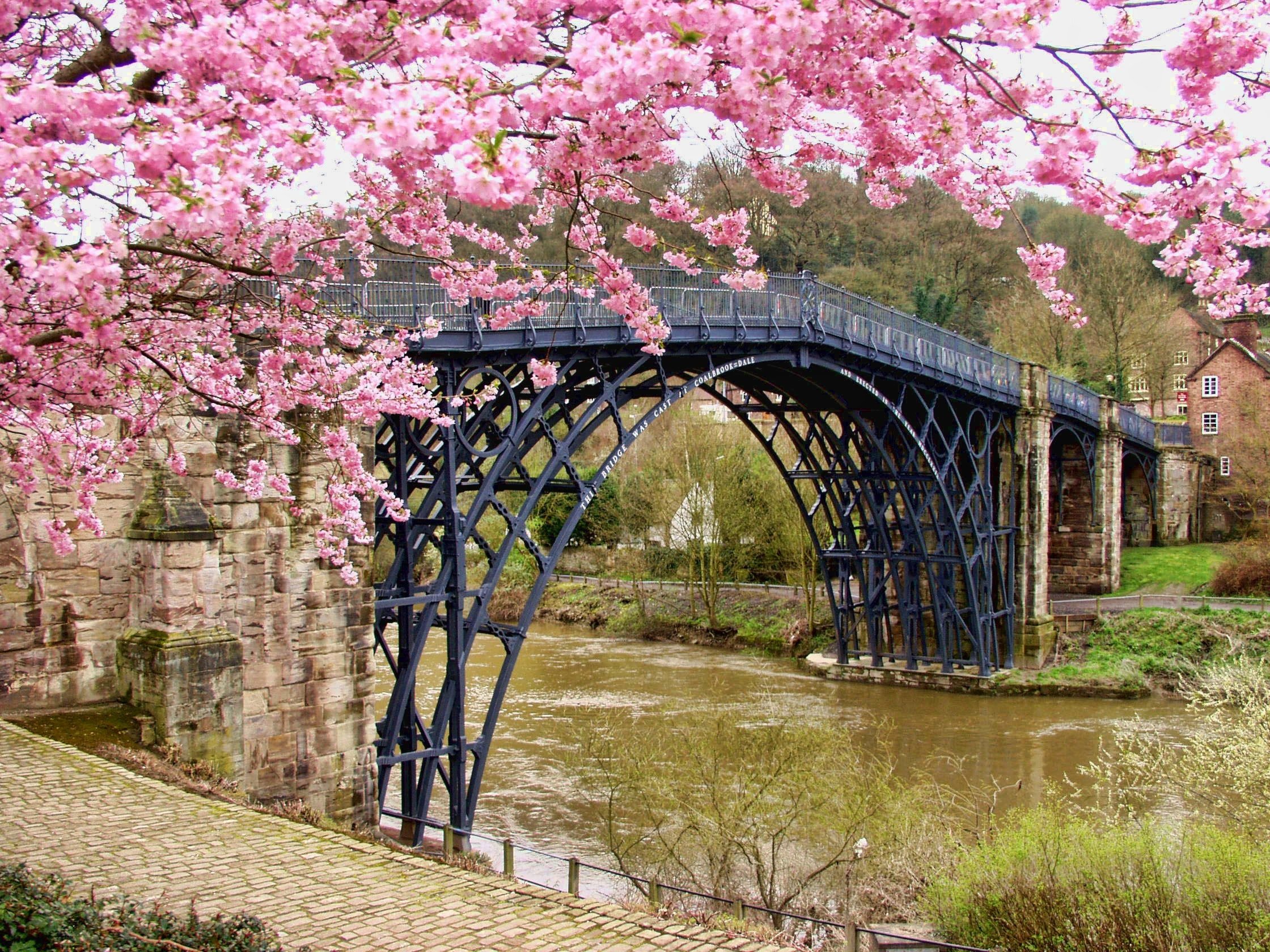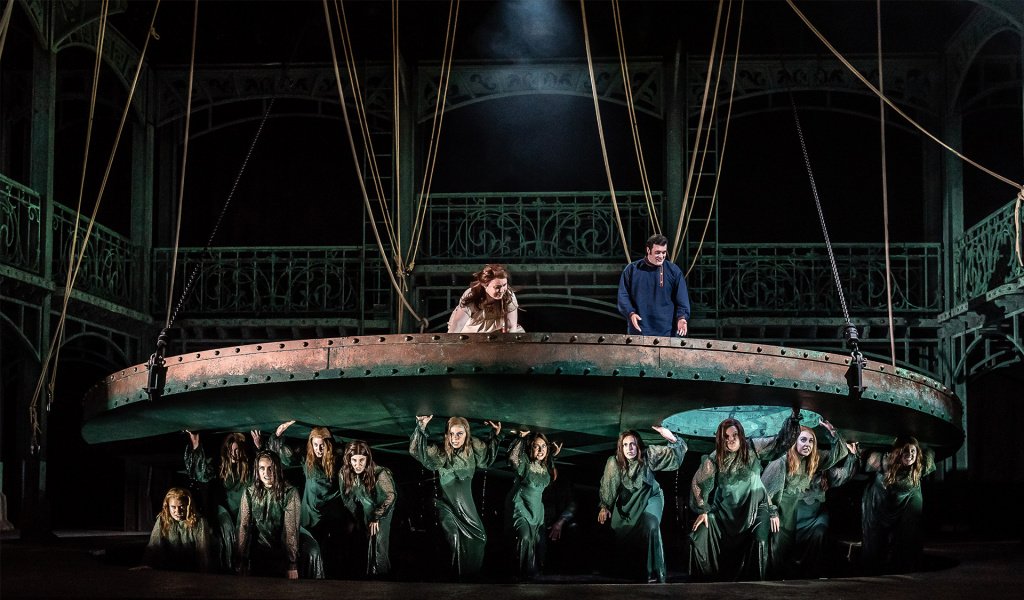Too much opera! Never! The summer season of opera and opera festivals is substantial. This year, Garsington Opera entertained us with an interesting Rusalka by Dvorak. The fairy-tale production was directed by Jack Furness and designed by Tom Piper, but did not appear to reach the heights of Pountney’s 1983 ENO production. However, its shallow stage water and round overhead disc with a circular hole is at the centre piece of this production. It is not spectacularly interesting, but it does allow an impressive cast a full stage to work with, and some of the singing is glorious.
The Welsh soprano Natalya Romaniw steals the show with her thrilling spinto soprano and deep low notes, and she sings a wonderful “Song to the Moon”. At the end of the opera, her kiss kills her Prince in a big MeToo moment. The Prince, sang by the dramatic Australian tenor Gerald Schneider, ends up dying in her arms as she is redeemed by her love for him.
There were a number of Covid illnesses on the night and we missed Christine Rice as The Witch, but Jade Moffat, a recent graduate from the Guildhall School of Music & Drama, was a wonderful substitute. The same applies for Ella de Jongh and Lila Chrisp, as The Foreign Princess and a Wood Nymph.
Not as brilliant as last year’s Rosenkavalier, but a clear indication that the international standards of this opera house continue.
Rusalka @Garsington Opera 2022
In some way, it appeared that illness was affecting the majority of the houses. Ponchielli’s rarely performed La Gioconda was a stage for the return of Joseph Calleja to Grange Park Opera, in a production directed by Stephen Medcalf and conducted by Stephen Barlow. Unfortunately Calleja was ill. However, dramatically, he marked his role as best he could to enable the performance to go on. There can be no last minute substitute for this great tenor.
The sets designed by Francis O’Connor were sliding green marble steps leading to a canal in Venice, with a 16th century feel. There was the addition of some webbed steel rigging in Act 3, which formed the basis of a ship’s mast, which was also used as the background for the next show at Grange Park Opera, The Flying Dutchman. The lighting design by Tim Mitchell was excellent, as was an outstanding chorus and the wonderful duet between Gioconda, performed by dramatic soprano Amanda Echalaz and Laura , sang by mezzo soprano Ruxandra Donose. Echalaz’s substantial voice was only marred by her inaudible diction and her need occasionally to reach for the high notes. Perhaps the voice of the night was the Barnaba of the British baritone, David Stout. The brutality of Act 3 was, however, somehow sensitised by the comic ballet dance, choreographed by Sarah Fahie to the Camp Grenada music of some years ago. What fun!
Two of Grange Park’s other operas were both very well received, being Wagner’s Der Fliegende Hollander and Verdi’s Otello. Anthony Negus conducting the Wagner. The Dutchman would always have a quality musical presentation and Stephen Medcalf as director, used the Gioconda Act 3 set as a free staging of this opera. Bryn Terfel was always an authoritative brooding Dutchman and Rachel Nicholls was an enthralling Senta. As a Covid last minute stand-in, Peter Rose’s bass in the role of Dalland was thrilling, and Nicky Spence’s Erik portrayed a great sense of sadness and loss. Anthony Negus kept it all together.
And indeed, the conductor Gianluca Marciano kept together a very good Otello directed by David Alden. This was a production updated to the end of the Second World War, based on a requisitioned run-down military hotel in Cyprus. The extraordinary cast of three international British singers were all making their debut in their respective roles, and so, understandably, the melodrama did wain in parts. Gwyn Hughes Jones as Otello is an excellent work in progress, although his lack of a deep growl was noticeable. Simon Keenlyside’s, Iago, was a sophisticated portrayal which showed that he is capable of great things in this role, and Elizabeth Llewllyn as Desdemona, apart from a considerable vibrato at the beginning, sang a deeply moving Willow Song and Ave Maria. The excellent Cassio of Elgan Llyr Thomas and Roderigo of Anthony Flaum, completed the luxury casting of this great piece. Grange Park Opera picked three excellent operas to showcase their international credentials.
La Gioconda @Grange Park Opera 2022
At Longborough Festival Opera, Wagner’s Siegfried conducted by Anthony Negus, and Korngold’s Die Tote Stadt conducted by Justin Brown, were the two main offerings. Siegfried was directed by Amy Lane and was mainly a filmed production projected on a back screen. This is a long opera, and Anthony Negus coped extraordinarily well with its complexities. The Australian Bradley Daley was a Heldentenor of note in the role of Siegfried, with the Welsh baritone Paul Carey Jones as an intellectual plush Wanderer. The Scottish soprano, Lee Bisset, had a voice of substance and intensity as Brünnhilde, but the voice of the night was the Alberich of the British baritone Mark Stone. His virile tone produced a dramatic interpretation of this role, full of textural detail.
Die Tote Stadt was a semi-staged performance directed by Carmen Jakobi with excellent lighting designed by Ben Ormerod. Illness once more meant that Rachel Nicholls was a late stand-in for Marietta and the substantial role was outstandingly sung by this great soprano. Peter Auty sang the role of Paul with Luci Briginshaw as Juliette.
Korngold completed this opera at the age of twenty-three and its premiere took place in Germany in 1920. Thereafter, Korngold headed to America in the 1930’s and had a very successful Hollywood career. Andre Previn used to say “if Korngold sounds like film music, that is because film music sounds like Korngold”. He was one of the most important influencers in the genre’s development, bringing into the film studio the composition techniques of Puccini, Wagner and Strauss. The high drama, generous spirit, vivid atmosphere, and dazzling score of Die Tote Stadt are finally gaining appropriate recognition as an opera for the ages.
Die tote Stadt @Longborough Opera Festival 2022
Glyndebourne’s new production of Puccini’s La Bohème, conducted by a rather unsophisticated and loud Jordan de Souza was an interesting affair, not least because of the interest in the Dutch director Floris Visser. The set design was one long road into the night, which acted as a constraint to much of the action on stage; Visser also introduced Christopher Lemming’s “death” as a new concept, working with the excellent Mimi of Chilean soprano, Yaritza Veliz. Vuvu Mpofu’s Musetta was somewhat understated, but the Rodolfo of Long Long and the Marcello of Daniel Scofield were both excellent. Richard Suart as Benoit stole the show, as always! An interesting concept, not yet fully realised.
The Grange Festival’s new production of Verdi’s Macbeth, conducted by Francesco Cilluffo and directed by Maxine Braham, I have already reported on, as I also have on Opera Holland Park’s excellent double bill of Delius’s Margot La Rouge and Puccini’s Le Villi.
The Israeli Opera in Tel Aviv, produced an excellent Verdi’s La Traviata conducted by Dan Ettinger and directed by Alessandro Talevi. The Meitar Opera Studio alumni Hila Baggio took the title role in a fresh sexually mixed interpretation of Violetta’s performance. Alfredo Germont was a capable Leonardo Capalbo and Giorgio Germont was a plush Ionut Pascu. Both stage direction and lighting design were outstanding, with a hint of lesbian love at the end of Act 1.
Ettinger’s evening overall was somewhat varied. He produced wonderful musical moments which, occasionally, and particularly at the end of the opera, were too laboured.
La Bohème @Glyndebourne 2022
Meanwhile, back in London, The Royal Opera House offered a summer of great opera starting with the outstanding production by Damiano Michieletto of Cavalleria Rusticana and Pagliacci, interspersed with Keith Warner’s production of Otello, and finishing with a remarkable concert performance of Verdi’s Attila, conducted by the Italian Speranza Scappucci.
Mascagni’s Cavalleria Rusticana and Leoncavallo’s Pagliacci were superb. Over the years, this production has improved with age, and on this occasion, with Antonio Pappano conducting, the result musically was of the highest standard. The church scene in Cavalleria Rusticana never ceases to amaze, and the cast overall were outstanding.
South Korean tenor Seokjong Beak was a terrific Turiddu, having taken over from the indisposed Jonas Kaufmann. However, he didn’t sing Canio in Pagliacci; that role was taken on by Roberto Alagna who was vocally on top form. Romanian soprano Aleksandra Kurzak performed both main soprano roles, Santuzza and Nedda. Her middle and lower range notes were terrific, although she had a very slight struggle at the very top of her voice. Dimitri Platanias as both Alfio and Tonio, sang with real authority throughout. All the other parts were performed beautifully, with Elena Zilio as Mamma Lucia, Aigul Akhmetshina in the role of Lola, and Mattia Olivieri as Silvio. The chorus were on top form, as they were in Verdi’s Otello.
Conductor Daniel Rustioni drove Verdi’s music at a good pace, but the real disappointment was the Otello of Russell Thomas. This was an Otello that looked the part with real substance, but whose voice was constrained with a disappointing lack of heft when it was most required. The role of Desdemona was taken by the Armenian soprano Hrachuki Bassenz, who had a small scale, sweet, angelic voice ideally suited for the Willow Song and Ave Maria. However, it was Chistopher Maltman’s Iago who really shone through. His, was a voice of real substance; an Iago to be frightened of, who also thrilled in his Act 2 duet with Otello.
Cavalleria Rusticana @Royal Opera House 2022
The thrilling concert performance of Verdi’s Attila, closed the ROH’s season. This was indeed a suitable climax, with the debut of Italian conductor Speranza Scappucci. Conductor, orchestra and chorus were all on stage. it was a delight to see Scappucci’s incredible energy producing blood and thunder where required, and sensitivity elsewhere. A rousing performance, helped by a rousing chorus, and the great performance of Russian bass Ildar Abdrazakov in the title role, who was in majestic vocal form.
There has been no revival of the 20- year-old Moshinsky production of this opera. The last performance had Samuel Ramey tearing his shirt off in his great aria, and baring his chest. Sadly, Covid had ravaged Sondra Radvanovsky’s Odabella, as well as Joseph Calleja’s Foresto. In the end, Maria Jose Siri, the Uruguayan soprano stepped in to sing Odabella, and Romanian tenor Stefan Pop replaced Calleja. Both sang rousingly, as did the Romanian singer Alexander Kopeczi in the role of Leone. Ezio was sung by the only British representative, baritone Simon Keenlyside. He has such an aristocratic voice but occasionally he seemed somewhat vocally tired, which is unsurprising bearing in mind his parallel performances in the role of Iago at Grange Park Opera.
Attila, this beautifully written early Verdi piece, is a suitable climax to a summer of great opera performances around the country and elsewhere.
David Buchler
Click here to book your tickets for The Friends of Israel Opera’s comeback Charity Gala Evening ‘CHAZANUT MEETS COVENT GARDEN’, on Sunday 23 October at 6.15PM! The evening will be hosted by Sir Sydney and Lady Lipworth at The Gables, 115 Hamilton Terrace, London NW8 9QU.
Your kind and generous donations are also welcomed here!






